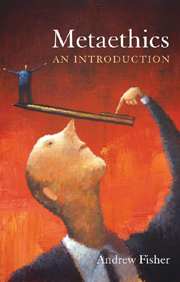Book contents
- Frontmatter
- Contents
- Preface
- Introduction
- 1 The open question argument
- 2 Emotivism
- 3 Error theory
- 4 Moral realism and naturalism
- 5 Moral realism and non-naturalism
- 6 Quasi-realism
- 7 Moral relativism
- 8 Moral psychology
- 9 Moral epistemology
- 10 Fictionalism and non-descriptive cognitivism
- Questions
- Glossary
- References
- Index
3 - Error theory
- Frontmatter
- Contents
- Preface
- Introduction
- 1 The open question argument
- 2 Emotivism
- 3 Error theory
- 4 Moral realism and naturalism
- 5 Moral realism and non-naturalism
- 6 Quasi-realism
- 7 Moral relativism
- 8 Moral psychology
- 9 Moral epistemology
- 10 Fictionalism and non-descriptive cognitivism
- Questions
- Glossary
- References
- Index
Summary
There seems to me no doubt that our ethical judgments all claim objectivity; but this claim, to my mind, makes them all false.
(Russell [1922] 1999: 123)There are no objective values.
(Mackie 1977: 10)CHAPTER AIMS
To explain why error theory adopts cognitivism.
To explain why Mackie rejects objective values.
To outline some worries about error theory.
To outline some implications of error theory.
Introduction
In this chapter we shall discuss John Mackie's error theory as put forward in his Ethics: Inventing Right and Wrong (1977). He argues that:
Moral judgements express beliefs and are truth-apt (cognitivism).
There are no objective moral values (non-realism).
This leads him to claim that:
All moral judgements are systematically and uniformly false.
We shall consider these claims in turn and then discuss a number of problems arising from Mackie's account.
John L. Mackie (1917–1981)
1967–1981: Fellow of University College, Oxford.
Key text: Ethics: Inventing Right and Wrong (1977).
Defends error theory, the view that (i) moral judgements describe the world as containing objective moral values but (ii) the world does not contain such things. Consequently, all our moral judgements are systematically and uniformly false.
Why be a cognitivist?
Error theorists find cognitivism attractive partly because they find noncognitivism so unattractive.
Information
- Type
- Chapter
- Information
- MetaethicsAn Introduction, pp. 39 - 54Publisher: Acumen PublishingPrint publication year: 2011
